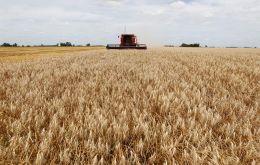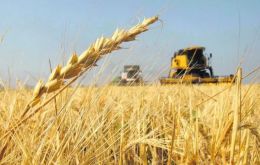MercoPress. South Atlantic News Agency
Tag: wheat
-
Monday, October 12th 2020 - 09:15 UTC
Argentina approves growing GM drought resistant wheat; needs OK from its principal market, Brazil

Argentina has become the first country to approve the growth and consumption of genetically modified wheat, the country's agriculture ministry announced. The ministry's scientific commission said in a statement released in Buenos Aires that it had approved a drought-resistant variety of wheat in the world's fourth-largest exporter of the crop.
-
Wednesday, September 2nd 2020 - 08:20 UTC
Paraguayan wheat exports drop 42% in July because of stricter controls in Brazil

The Paraguayan Chamber of Cereals and Oilseed exporters and traders, Capeco reported that the country's exports fell by 42.2% in July, with 267,949 tons, compared to 464,005 tons shipped in the previous month. This represents a drop of about 196,056 tons month-on-month.
-
Thursday, August 6th 2020 - 09:21 UTC
Destruction of Beirut port silos leaves Lebanon with only a month of wheat

Lebanon’s main grain silo at Beirut port was destroyed in a blast, leaving the nation with less than a month’s reserves of the grain but enough flour to avoid a crisis, the economy minister said on Wednesday.
-
Wednesday, July 8th 2020 - 07:33 UTC
World 2020 cereal production forecasted to reach new record

World cereal production is poised to reach a new record level of 2 790 million tons in 2020 - up 9.3 million tons from the May forecast - surpassing the record-high registered in 2019 by as much as 3%, according to FAO's Cereal Supply and Demand Brief.
-
Saturday, July 27th 2019 - 09:55 UTC
Argentina expecting record harvest of wheat in a supply short market

Argentine wheat farmers are preparing for a record harvest, even as global rivals see crop yield prospects cut amid floods in the United States, searing heat in Europe and drought in Australia.
-
Thursday, July 25th 2019 - 05:09 UTC
Frosts in south Brazil will help foreign exporters of wheat

Brazilian wheat imports are poised to increase this year as a frost-damaged part of the crop in key producing regions of Paraná, which accounts for roughly half of the country's output, according to state government agency Deral.
-
Tuesday, June 25th 2019 - 09:07 UTC
Argentina sowing what is forecasted as an excellent crop of wheat, some 22 million tons

Argentine farmers are expected to plant 6.5 million hectares of wheat in the 2019/20 season, the government said in a report, citing good rainfall as the reason for the increase from its previous forecast of 6.46 million hectares.
-
Thursday, June 13th 2019 - 09:20 UTC
Wheat and barley production forecasted to increase; rains in US threaten maize crop

FAO's latest forecast for world cereal production in 2019 - available in the Cereal Supply and Demand Brief- points to an increase of 1.2 percent from the previous year to reach 2 685 million tons, a sharp downward revision from the forecast made in May when global cereal production was predicted to expand by 2.7 percent.
-
Wednesday, March 20th 2019 - 09:29 UTC
US and Brazil agree to lower barriers to agricultural trade, mainly wheat and beef

The United States and Brazil have agreed to steps aimed at lowering barriers to agricultural trade, focusing on wheat, pork and beef, the presidents of the two nations said in a joint statement on Tuesday.
-
Monday, March 18th 2019 - 08:18 UTC
US wheat and Brazilian fresh beef included in agriculture talks in Washington

Brazil is considering granting an import quota of 750,000 metric tons of U.S. wheat per year without tariffs in exchange for other trade concessions, according to Brazilian officials. That is about 10% of Brazilian annual wheat imports and is part of a two-decade-old commitment to import 750,000 metric tons of wheat a year free of tariffs that Brazil made — but never kept — during the World Trade Organization's Uruguay Round of talks on agriculture.
